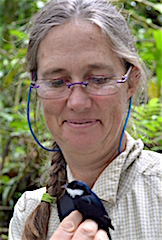August 25, 2016
National Science Foundation supports research on the effects of climate variation on tropical birds

A Kansas State University researcher is studying the effects of extreme rainfall on endangered tropical birds.
Alice Boyle, assistant professor in the Division of Biology, is spearheading a two-year, $200,000 National Science Foundation project to investigate how climate variation affects the survival, condition and reproduction of a small tropical bird, the white-ruffed manakin. The study aims to fill important information gaps that hamper our ability to predict consequences and mitigate ongoing global climate change.
"People have viewed the tropics as climatically stable and benign," Boyle said. "But climate change is happening everywhere, including the tropics. Tropical forests are not warming as quickly as the Arctic, but rainfall patterns are changing fast."
Boyle started working with manakins at the end of her doctoral research, when she was trying to figure out why birds migrate up and down mountains in the tropics.
"Everyone thought that birds tracked food resources," Boyle said. "But my work actually shows that bad weather — particularly severe rain — can be hard for birds to cope with."
Because weather shapes these birds' movements, they provide an ideal model to study how changed rainfall patterns affect different aspects of bird biology. Boyle plans to compare the responses of manakins to variation in long-term rainfall patterns and short-term rainfall events across populations spanning moderately wet to extremely wet forests in Costa Rica.
"We have no idea what climate change will mean for the most biodiverse communities on the planet, because we don't know why birds respond the way they do to storms and changing rainfall patterns," Boyle said. "This project aims to fill that gap."
The project will provide laboratory training and opportunities to conduct field research in Costa Rica for multiple graduate and undergraduate students at K-State.
